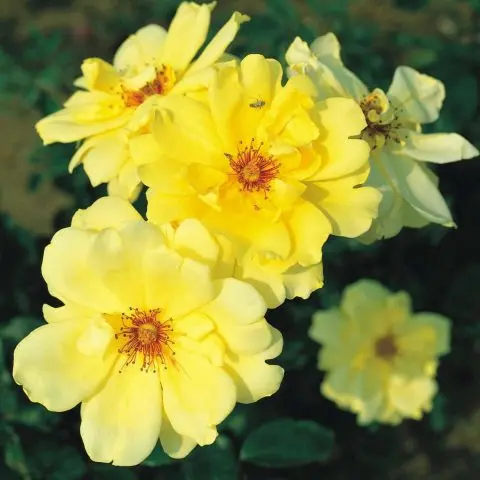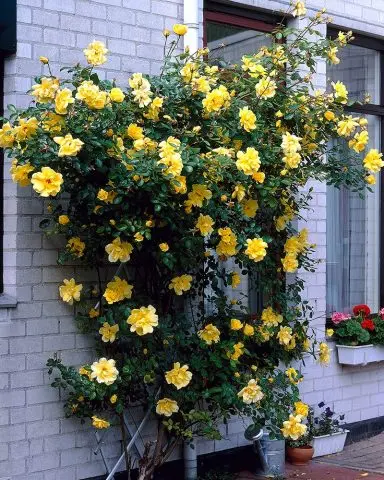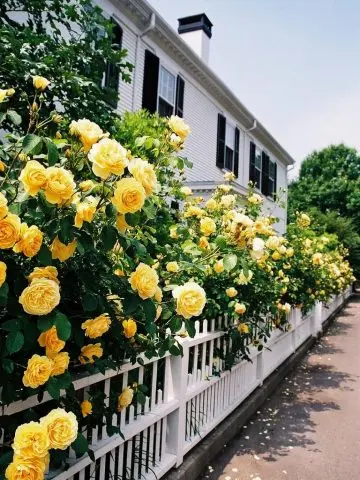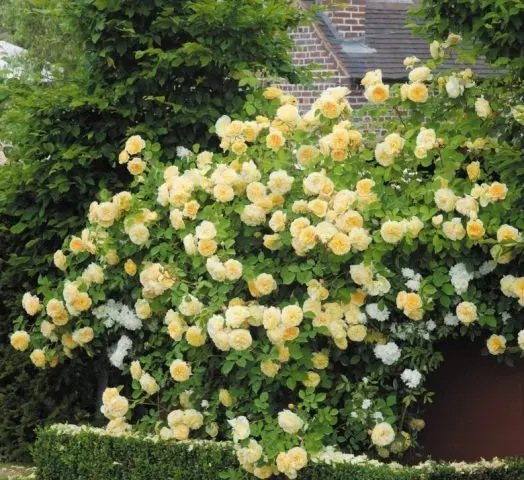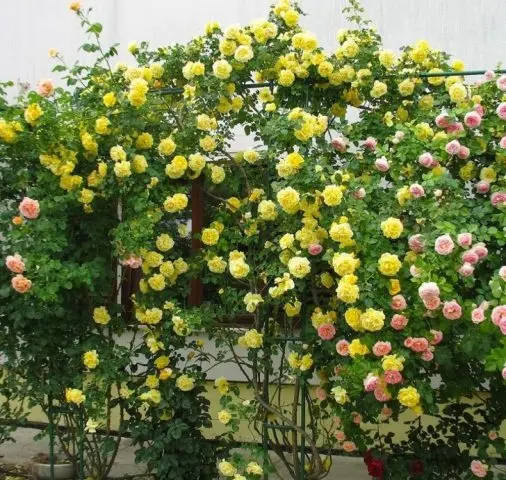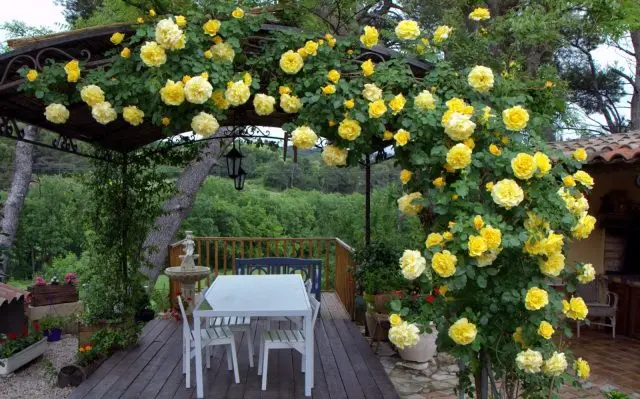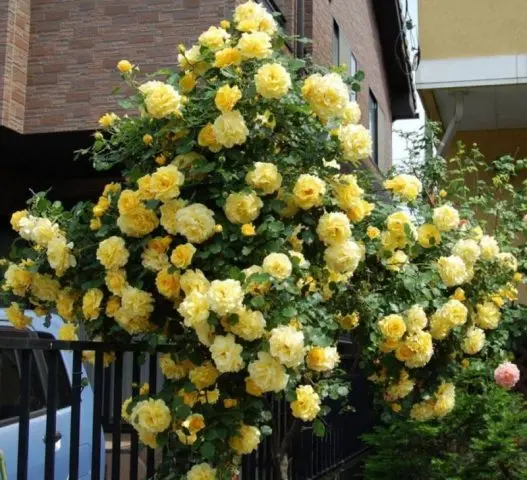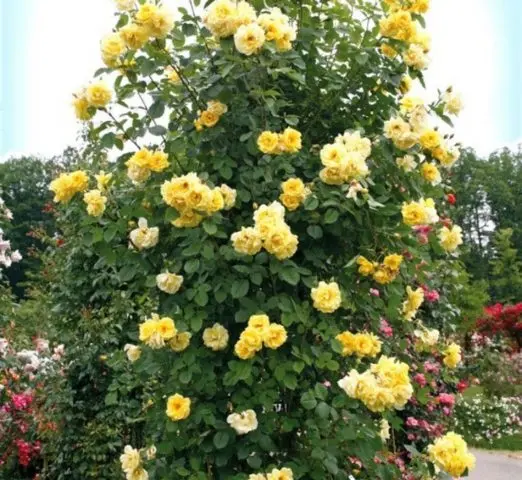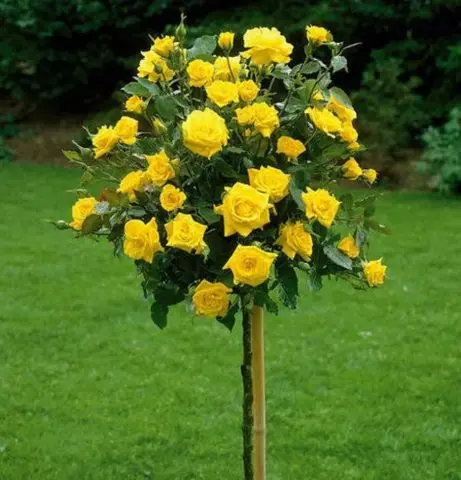Contents
- History of breeding
- Description and characteristics of the climbing rose Golden Showers
- Advantages and disadvantages of the climbing yellow rose Golden Shouers
- Methods of reproduction
- Growing and caring for a climbing rose Golden Shovers
- Pests and diseases
- Climbing rose Golden Showers in landscaping
- Conclusion
- Climbing Rose Reviews Golden Showers
The large-flowered climbing rose Golden Showers belongs to the climber group. The variety is tall, has hard, stable stems. Rose reblooming, heat-loving, shade-tolerant. Recommended for cultivation in the sixth climatic zone.
History of breeding
The hybrid variety was obtained in California by breeder Walter Lammers. In 1956, Golden Showers became the first in a list of grandiflora roses created by a scientist. The variety was based on the tea-hybrid Charlotte Armstrong (Charlotte Armstrong), which provided large buds, and the branchy climber Captain Thomas (Captain Thomas). The result is a hybrid with large inflorescences and a tall, voluminous bush.
Description and characteristics of the climbing rose Golden Showers
Golden Showers is a perennial plant whose biological cycle lasts for 15 years. The climbing culture grows quickly, in the second year of vegetation, the first buds appear on the bush, which are removed in order to redirect the supply of nutrients to the formation of the root system. The climbing rose is fully formed by the fourth season.
The variety is characterized by early flowering. The first buds bloom at the end of May on perennial and last year’s stems. The second wave of flowers appears on the lashes of the current season, they open at the end of August.
Golden Showers has poor frost resistance, so the variety is recommended to be grown in a mild climate, where in winter the temperature does not fall below -20–23 0C. The climbing rose is common in the Stavropol, Krasnodar Territories and the southern part of the Rostov Region.
Golden Showers is a shade tolerant plant. A climbing rose cannot always be in an open area. The flowers burn out, and burns appear on the leaves.
Determine a place for a climbing variety with periodic shading. For photosynthesis, the variety needs 3-4 hours of ultraviolet access. In the central regions, the cultivation of climbing Golden Showers is possible only in a sunny area, with shelter for the winter and protection from frost in the spring.
Climbing culture lends itself well to molding. From a seedling, you can create a standard version or grow it in the form of a medium-sized bush without long stems. In the latter case, the flowers are formed singly on the stem and go for cutting.
Description of the re-blooming climbing rose Golden Showers:
- An adult plant has a dense branched crown. Perennial lashes are dark green, thick, with short spikes. Annual stems are not prickly, with a smooth surface.
- The height of the bush reaches 3,5 m, the volume of the crown is 2 m.
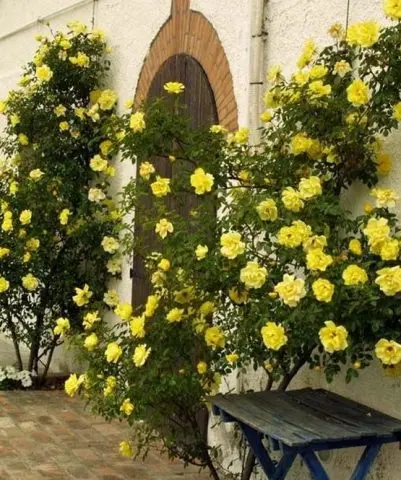
- The buds are collected in inflorescences of 3–5 pieces, single ones are less common.
- The flowers are semi-double, have the shape of a glass, their diameter is 8–10 cm. The buds consist of 35–40 petals with an open core.
- Petals are rounded with wavy edges. Filaments dark red with large brown anthers.
- Climbing Golden Showers forms bright yellow buds. The color of the opened flower is lemon or beige. They are released one by one. Flowering of the first wave begins in May and lasts until mid-July. Repeat flowering is less abundant, lasts from August to October.
- Dark green leafy plates are leathery, with a glossy sheen. Attached 3-5 pcs. on long stems.

Climbing rose Golden Showers calmly reacts to high humidity, during prolonged rains the flowers do not lose their decorative effect
The aroma of the variety is delicate, fruity, stable. It can be felt in any weather.
Advantages and disadvantages of the climbing yellow rose Golden Shouers
Golden Showers is a fairly common variety in ornamental gardening. The climbing variety owes its popularity to a number of advantages over other climbers:
- repeated and long flowering;
- fast growth;
- amenable to molding;
- flowers do not freeze during prolonged rainfall;
- shade tolerance;
- early budding;
- a small number of spikes;
- standard agricultural practices;
- persistent, unobtrusive aroma.
There are only two drawbacks to Golden Showers: low frost resistance and susceptibility to fungal infections.
Methods of reproduction
The climbing rose belongs to the hybrid varieties, so it will not work to get planting material from seeds on your own. Germination of the material is weak, seedlings do not retain varietal characteristics. The method of dividing a bush for a climbing variety is rarely used. An adult plant does not take root well after transfer, the death of the main root system and the plot is possible.
Climbing rose is propagated by layering, cuttings or budding. The latter method gives a good result if the grafting technology was carried out correctly, and a variety with the same flowering period was used as a rootstock.
To get layers, in the spring, last year’s shoot is fixed to the soil surface and covered with soil. Vegetative buds will take root in a season, they are insulated for the winter. In the spring, after the appearance of young shoots, the stem is removed, cut and determined on the site.
The material is taken from last year’s whip. It is cut into pieces 10 cm long. The lower cut is made at an angle, the upper part is left flat so as not to be confused when planting. Get cuttings before the appearance of buds or after the flowering of the first wave. The material is placed on the site in a fertile substrate, covered with cut plastic bottles from above.
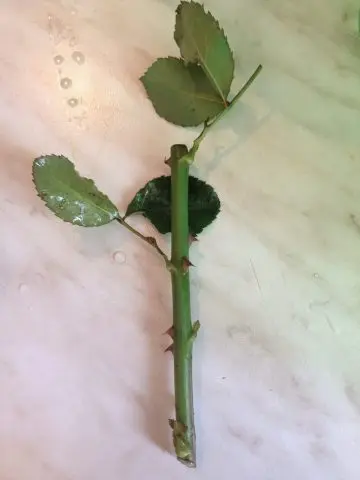
Golden Showers cuttings take root well and grow quickly, and after 2 years the climbing rose gives the first buds
Growing and caring for a climbing rose Golden Shovers
A healthy plant with good stem formation and abundant flowering can only be grown on neutral soil. If the composition does not meet the requirements of a climbing rose, it is adjusted 2 months before the seedling is placed in open ground.
For the south, spring planting time is suitable, when the threat of return frosts has completely passed. In autumn, the climbing culture is placed in the ground 1,5 months before the first frost. The place is chosen protected from drafts, with moderate soil moisture. Climbing rose does not tolerate lowlands and heavy soils, these factors are taken into account when choosing a site.
During planting, drain the pit and lay the nutrient substrate. Climbing rose Feels comfortable near the support or the southern wall of the building.
Agricultural techniques:
- To prevent the climbing rose from wasting nutrients on fruit ripening, inflorescences that have ended their life cycle are removed from the bush.
- The climbing rose variety is characterized by satisfactory drought resistance. Golden Showers has enough seasonal rainfall, in a drought it is watered with plenty of water, but not more than once a week.
- They provide aeration of the soil and remove weeds, these measures are especially relevant for young seedlings of climbing Golden Shauers when the root mass is growing.
- So that the trunk circle does not dry out, it can be mulched.
- A climbing rose up to the age of two does not require top dressing. In subsequent seasons, nitrogen preparations are applied in the spring, organic matter in the summer, and complex fertilizers in the fall. When Golden Showers enters the flowering phase, phosphorus is added to the main top dressing during budding, and potassium is used during flowering.
- Climbing rose blooms profusely only on stems of three years of age. Every autumn, the bush is thinned out, old lashes are removed, but the shoots of the current season are not touched. In the spring, sanitary cleaning is carried out, dry and frost-damaged areas are cut off.
Preparation for the winter climbing Golden Showers consists of the following activities:
- plentiful watering;
- hilling;
- mulching.
For the south, these events are enough. In a temperate climate, after the main preparation, the whips are removed from the support, placed on straw or dry leaves, covered with any material.

You can wrap a rose without removing the shoots from the structure
Pests and diseases
Golden Showers is characterized by medium resistance to infections. The main problem is powdery mildew. For prevention purposes, in the fall, the plant and the soil around are sprayed with copper sulphate, and colloidal sulfur is used in the spring. If there are signs of the spread of the fungus, Fitosporin is used. Climbing roses can suffer from black spot. In this case, the remedy “Khom” is effective.
The plant is attacked by aphids. To eliminate pests use “Confidor”. Less commonly, a climbing rose is struck by a rose leafworm. Destroy caterpillars “Iskra”.
Climbing rose Golden Showers in landscaping
Climbing rose is a frequent element that is used in landscape design. Golden Showers has been cultivated since the second half of the XNUMXth century, so the variety is common in warm climates. Bushes are used in various design techniques, which include a climbing tall variety. Golden Showers with yellow inflorescences is in perfect harmony with red or pink varieties. Climber is often used for vertical gardening, fixing shoots to a support.
Examples of using Golden Showers in horticulture:
- Decorate the walls of buildings.

- Create arched structures.

- With linear planting, improvised hedges are obtained.

- Close unaesthetic sections of fences.

- Zoning the area.

- Arrange gazebos.

- Decorate fences.

- Include in rose gardens.

- Create a color accent on the lawn.

Conclusion
Climbing rose Golden Showers is a re-blooming variety that is categorized as a climber. A tall branchy plant with a dense crown and abundant budding is used in ornamental gardening for vertical gardening. A rose can be grown on a trunk. A variety with low frost resistance, standard agricultural practices and shade tolerance, recommended for the regions of the North Caucasus.










